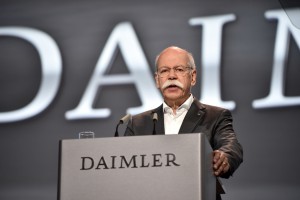Daimler Group earnings declined by 26% during the third quarter as earnings before interest and taxes dropped to 2.5 billion euros from the 3.4 billion posted in the third quarter of 2017.
Daimler’s net earnings of 1.76 billion euros were significantly below the prior-year figure of 2.23 billion euros but Daimler CEO Dieter Zetsche said the outlook for the balance of the year was encouraging.
“The automotive industry and thus also Daimler are still in a very challenging environment. The continued high demand from our customers makes us confident for the fourth quarter,” Zetsche said.
The EBIT for the Mercedes-Benz Cars division was significantly lower than in the third quarter of last year, due in particular to a decrease in sales volume and expenses in connection with governmental proceedings and measures for diesel vehicles.
(Daimler cuts earnings estimates as environment gets tougher. Click Here for the story.)
Daimler Trucks achieved significantly higher earnings than in the prior-year period, primarily as a result of increased unit sales in the NAFTA region but Mercedes-Benz Vans did not achieve EBIT of the third quarter of 2017.

Mercedes expects its next generation Sprinter to be capable of adopting a battery-electric powerplant and autonomous driving features.
Daimler Buses’ earnings in the third quarter of 2018 were slightly lower than in the prior-year period. The increased level of interest rates was the main reason for a decrease in earnings at Daimler Financial Services. Exchange-rate effects had an overall negative impact on the Group’s operating profit.
In the first nine months of 2018, the cash flow for the industrial led to a cash outflow of €60 million euros, compared with 5.8 billion in 2017.
(Click Here for more about the new Mercedes-Benz S-Class hybrid.)
The decrease was primarily due to the general business performance, reflecting in particular, an increase in inventories because of restrictions in the availability of vehicles caused by the delay of certification processes at Mercedes-Benz Cars.
In addition, Mercedes-Benz Vans experienced delivery delays caused by certain measures for diesel vehicles. Furthermore, there was an impact from increased investments in property, plants and equipment. However, lower income-tax payments had a positive impact on the free cash flow of the industrial business.
Compared with Dec. 31, 2017, the net liquidity has decreased by €3.1 billion euros to €13.5 billion. The dividend payment to shareholders of Daimler AG led to a decrease in net liquidity that was only partially offset.
(To see more about the future of tie-up with Renault-Nissan Alliance, Click Here.)
“In the past quarter, there were various negative factors that had a significant impact on our earnings. Nonetheless, we achieved EBIT of €2.5 billion,” said Bodo Uebber, Daimler’s chief financial officer. He added the company had no choice to continue investing in the future.

